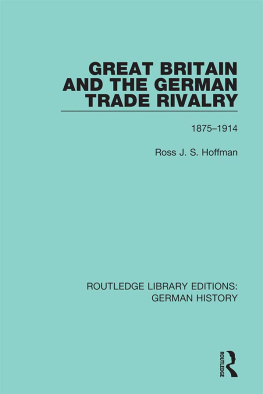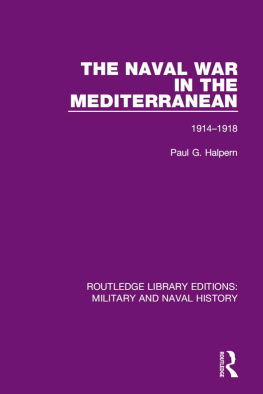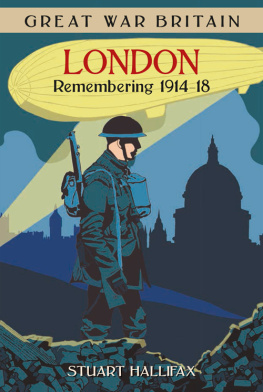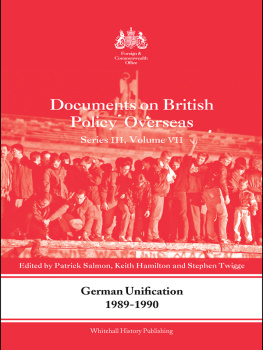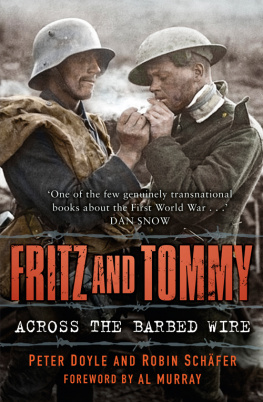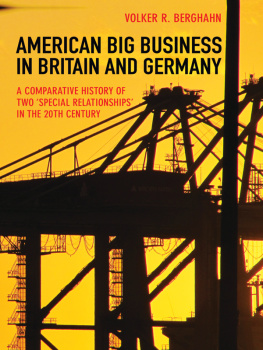ROUTLEDGE LIBRARY EDITIONS:
GERMAN HISTORY
Volume 23
GREAT BRITAIN AND THE GERMAN TRADE RIVALRY
GREAT BRITAIN AND THE GERMAN TRADE RIVALRY
18751914
ROSS J. S. HOFFMAN
First published in 1933 by the University of Pennsylvania Press
Re-issued in 1983 by Garland Publishing Inc.
This edition first published in 2020
by Routledge
52 Vanderbilt Avenue, New York, NY 10017
and by Routledge
2 Park Square, Milton Park, Abingdon, Oxon OX14 4RN
Routledge is an imprint of the Taylor & Francis Group, an informa business
1933 University of Pennsylvania Press
All rights reserved. No part of this book may be reprinted or reproduced or utilised in any form or by any electronic, mechanical, or other means, now known or hereafter invented, including photocopying and recording, or in any information storage or retrieval system, without permission in writing from the publishers.
Trademark notice: Product or corporate names may be trademarks or registered trademarks, and are used only for identification and explanation without intent to infringe.
British Library Cataloguing in Publication Data
A catalogue record for this book is available from the British Library
ISBN: 978-0-367-02813-8 (Set)
ISBN: 978-0-429-27806-8 (Set) (ebk)
ISBN: 978-0-367-24592-4 (Volume 23) (hbk)
ISBN: 978-0-429-28338-3 (Volume 23) (ebk)
Publishers Note
The publisher has gone to great lengths to ensure the quality of this reprint but points out that some imperfections in the original copies may be apparent.
Disclaimer
The publisher has made every effort to trace copyright holders and would welcome correspondence from those they have been unable to trace.
GREAT BRITAIN AND THE GERMAN TRADE RIVALRY 18751914
Ross J. S. Hoffman
This facsimile has been made from a copy in
the New York Public Library.
Library of Congress Cataloging in Publication Data
Hoffman, Ross John Swartz, 1902
Great Britain and the German trade rivalry; 18751914.
(The World economy)
Reprint. Originally published: Philadelphia: University
of Pennsylvania Press, 1933.
Originally presented as the authors thesis (Ph. D.
University of Pennsylvania)
Bibliography: p.
Includes index.
1. Great BritainCommerceGermanyHistory.
2. GermanyCommerceGreat BritainHistory.
3. Great BritainCommercial policyHistory.
4. GermanyCommercial policyHistory. 5. Competition,
InternationalHistory. I. Title. II. Series:
World economy (New York, N.Y.)
HF3508.G3H63 1983 382.30942 82-48310
ISBN 0-8240-5365-6
Design by Jonathan Billing
The volumes in this series are printed on acid-free,
250-year-life paper.
Printed in the United States of America
GREAT BRITAIN
AND THE
GERMAN TRADE RIVALRY
GREAT BRITAIN
AND THE
GERMAN TRADE RIVALRY
18751914
A THESIS
IN HISTORY
PRESENTED TO THE FACULTY OF THE GRADUATE SCHOOL OF THE
UNIVERSITY OF PENNSYLVANIA IN PARTIAL FULFILLMENT
OF THE REQUIREMENTS FOR THE DEGREE
OF DOCTOR OF PHILOSOPHY
ROSS J. S. HOFFMAN
Copyright 1933
UNIVERSITY OF PENNSYLVANIA PRESS
Manufactured in the United States of America
TO MY MOTHER
PREFACE
T HIS volume represents an effort to describe three features of British history in the forty-odd years before the outbreak of war in 1914. They are: first, the inroad made by commercial and industrial Germany upon the far-flung business empire of Great Britain; second, the British national reaction to this German rivalry, and third, the influence of that rivalry upon the shaping of British policy toward Germany. The unity of my study consists in the organic relationship between those three subjects. Although it has been necessary to deal with the decline of Cobdenism in Britain, the general intensification of all international economic rivalries in the pre-war years, and cognate subjects, in order to fit my study into a right setting of historical circumstances, I do not think it will be found that I have stepped beyond the limitations stated above. That is the reason why I chose the title Great Britain and the German Trade Rivalry rather than, say, The Anglo-German Trade Rivalry. And that is my justification for having composed this book from materials almost exclusively British.
It will, I think, impress the reader that I have sought to track down, order, and compress within a small compass a very large, far-reaching and elusive thing. Whoever does not realize this fact can have little knowledge of the perplexing problems which face the student who seeks to particularize closely the economic rivalries of the modern world, to analyze the effect of these upon the public mind, and to discover the weight of their influence in shaping the policies of governments. These are difficult objects of historical investigation and one who attempts an approach to them can hardly expect to come away without at least a feeling of inadequacy. No one will be more aware than I of the many lacunae in this study, of the matters left untreated, the things left unsaid, the questions unanswered, and the very sketchy handling of many important matters. But in defense I may plead the formless immensity of my subject. If my book has no other value than to throw light here and there upon the less-studied features of the history of the pre-war years, and to draw attention to the deep importance of studying such things as economic rivalries and manifestations of the public mind, I shall feel that I did not write it wholly in vain.
I first conceived the idea of writing this book while a student under Professor William Ezra Lingelbach at the University of Pennsylvania, and it was to the University of Pennsylvania that I presented it last year as a doctoral dissertation. The actual writing of the book was done between the years of 1928 and 1932, during which time I was an instructor in history at New York University; but my connection with Pennsylvania was not broken, nor was the unfailing aid and advice of Professor Lingelbach interrupted. To him and to his university colleagues, especially Professor Edward P. Cheyney, I stand deeply indebted for having been able to complete this study. That, however, does not exhaust the obligations which I have incurred. My wife, Hannah McCruden Hoffman, worked side by side with me through a long summer in the newspaper room of the British Museum in London, copying vast quantities of the material with which my book has been made. My dear friend, Mr. Arthur Ruel Thompson, of Nanuet, N.Y., very kindly drew the figures for the plates which appear in the book. My colleague of New York University, Professor Jonathan French Scott, read the manuscript and offered shrewd and helpful criticism. Finally I would express my gratitude to the library staffs of Columbia University, the New York Public Library, and the British Museum.

